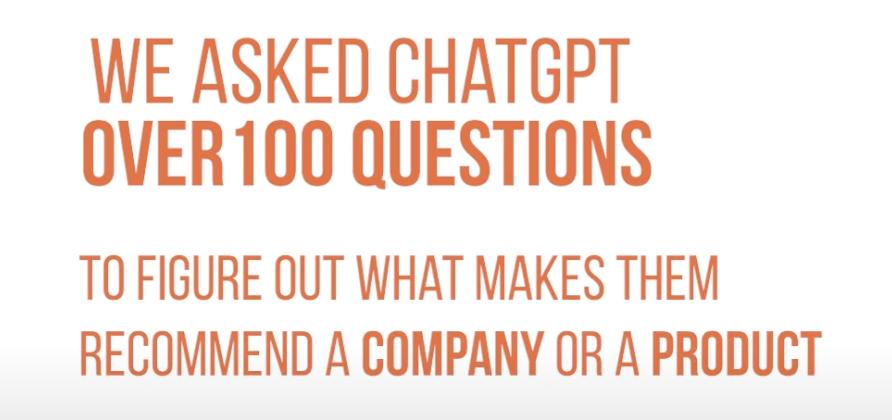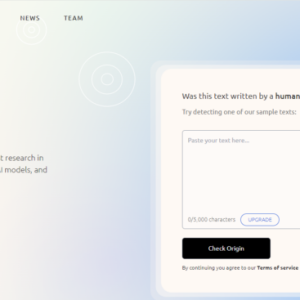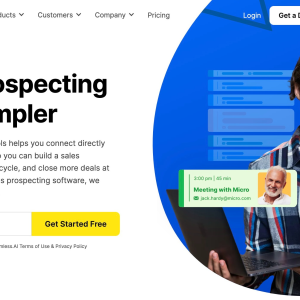In today’s digital age, leveraging artificial intelligence tools like ChatGPT can be a game-changer for brands looking to enhance their online presence and engage with customers in a more personalized way. By optimizing your brand for ChatGPT, you can create dynamic and interactive conversations that resonate with your target audience, ultimately driving brand loyalty and increasing customer satisfaction. In this guide, we will explore strategies and best practices for maximizing the potential of ChatGPT to elevate your brand and distinguish yourself in a crowded marketplace.
Can you optimize your brand for ChatGPT?
You are viewing: How to Optimize Your Brand for ChatGPT
Optimizing your website for visibility in AI models like ChatGPT involves a mix of traditional content optimization strategies and considerations specific to how AI models are trained and generate responses.
Since ChatGPT and similar models are trained on a vast body of text data from the internet up until their last training cut-off (for ChatGPT, this was April 2023), direct optimization, the way you might do it for search engines, isn’t straightforward.
However, there are several strategic approaches you can take to increase the likelihood that your marketing agency is recognized and possibly referenced by AI models in relevant contexts.
Here’s how (to get the best chance) to rank on ChatGPT.
Boost Engagement with AI
ChatGPT Provides Recommendations?
Although you can’t directly rank on ChatGPT, it does recommend services, companies and products. NP Digital asked ChatGPT over 100 questions to figure out what makes them recommend a company or a product.

They asked questions like what’s the best laptop for college students, what’s a great credit card when you have a low credit score, what’s the best electric SUV, and what headphone brand should I buy if I’m watching movies. They then analyzed the questions and answers to see if there were any patterns.
They analyzed 82 factors and found that six of them had a strong correlation. Here’s what matters to ChatGPT:
- Relevancy
- Brand mentions
- Reviews
- Authority
- Age
- Recommendations
This doesn’t mean that if you boost all these elements you’ll start ranking on ChatGPT right away. That’s not how it works. But since this AI tool continually updates its index, and if you work on these aspects, as with regular SEO, there’s a better chance that ChatGPT might start recommending your brand.
As you can see, the number one factor was relevancy, followed closely by brand mentions. This has evolved quite a bit. Earlier, it was conjectured that citations, links, and number of mentions would matter.
For example, when you search for the best marketing podcast, it shows “Marketing School,” which speaks to both relevancy and citations:

Authority is another factor we have due to our site’s standing, and we have a lot of reviews, especially at the end of every podcast. We’ve been around for seven to eight years, with thousands of episodes, which contributes to our citations and relevancy.
How Does ChatGPT Decide What to Recommend?
It would be interesting to know how ChatGPT decides rankings, like for the best marketing podcasts, so you know how you can rank higher. However, when asked, it doesn’t come up with useful information.
We also inquired about what makes a website rank well on Google and even humorous questions like making an atomic bomb (which ChatGPT rightly refuses to answer), but the answers are not very useful.
See more : Longshot AI Review: Is It The Best Fact-Checking AI Writer?
More useful AI tools:
- Google Gemini (formerly Google Bard) is better for analyzing a lot of information and figuring out what causes things to rank.
- Perplexity AI, a combination of ChatGPT and Google, is basically an AI search engine and chatbot that displays information sources in real-time. It’s great for research.


OpenAI recently launched the GPT store, akin to Apple’s launch of the App Store, which saw a lot of people diving into it. The GPT store hosts various applications, including a Code tutor by Khan Academy, and there’s a potential for creating a marketing tutor.

There are also designer GPT applications that help create and host websites, design presentations, logos, social media posts and more, showcasing the expanding range of plugins and opportunities in the GPT store. If you’re just starting out, looking at the store and getting in while it’s hot could be a worthwhile opportunity.
Now let’s take a look at the best things to do to optimize your brand for ChatGPT.
Boost Engagement with AI
How to Optimize Your Brand for ChatGPT
Let me say again, this is not a science (not yet). So these are just tips.
To get the best chance of ChatGPT recommending your brand, the biggest thing is to focus on improving your website’s visibility and relevance.
ChatGPT considers the following factors when determining whether to mention a specific brand:
- Brand mentions: The frequency of your brand or product being mentioned across the web.
- Reviews: Positive reviews and ratings contribute significantly to your credibility.
- Relevancy: Sites that talk about your brand, product or service positively, such as comparison sites and industry blogs.
- Recommendations: Other websites referring to your product or service increases your likelihood of appearing in ChatGPT’s recommendations.
- Authority: Social media following and domain authority play a part in establishing trustworthiness.
Note: We’re not including the sixth factor, age, since there’s nothing you can do about your brand’s age.
On a score of 0-1, here’s how it broke down according to NP Digital’s analysis:

To increase the likelihood of ChatGPT recommending your brand, products or services, follow these tips.
Brand Mentions
What It Means: The frequency and context in which your brand or product is mentioned across various online platforms, including blogs, news sites, forums and social media.
What to Do:
- Increase Online Presence: Actively participate in industry-related discussions, forums, and social media platforms. Engage with your audience by answering questions, offering advice and sharing relevant content.
- Collaborate with Influencers: Partner with influencers and thought leaders in your niche to talk about your brand or review your products.
- Press Releases: Regularly publish press releases about new products, features or significant milestones to get coverage from news outlets and blogs.
- Content Marketing: Produce high-quality, shareable content that includes your brand name, and be sure to have a solid content marketing strategy in place to distribute and promote your blog posts.
Reviews
What It Means: Positive feedback and ratings from customers on review platforms, your website, and product pages.
What to Do:
- Encourage Reviews: After purchase, follow up with customers encouraging them to leave a review. Make this process as easy as possible.
- Manage Negative Reviews: Address negative reviews promptly and professionally, offering solutions to any issues raised.

- Use Testimonials: Feature positive customer testimonials on your website and in marketing materials.
- Leverage Review Platforms: Ensure your products are listed on popular review sites relevant to your industry.
Relevant Sites
What It Means: Your brand or product’s presence and positive portrayal on comparison sites, industry blogs and websites that are authoritative in your domain.
What to Do:
- Guest Blogging: Contribute valuable content to relevant blogs and websites in your industry. This can include tutorials, case studies, or industry insights where you can mention your products or services.

- Partnerships: Partner with complementary businesses or websites to feature your products or services.
- SEO for Relevant Keywords: Optimize your content for keywords that comparison sites and industry blogs might use to find relevant products or services to review or compare.
Authority
See more : 9 Clever Ways Amazon FBA Business Owners Can Use ChatGPT
What It Means: The trustworthiness of your website and social media profiles, as measured by domain authority, social media following, and engagement rates.
What to Do:
- Improve SEO: Implement search engine optimization best practices to improve your site’s domain authority.
- Active Social Media Engagement: Grow and engage with your audience on social media platforms. Share valuable content, respond to comments, and participate in relevant conversations.
- Quality Backlinks: Aim to get backlinks from reputable sites in your industry. This can be achieved through guest blogging, collaborations, and creating valuable resources that others want to link to.
<iframe width=”761″ height=”428″ src=”https://www.youtube.com/embed/Fb6lH6-1ryw” title=”How to Get Backlinks Fast Using Photos, Videos, and Infographics” frameborder=”0″ allow=”accelerometer; autoplay; clipboard-write; encrypted-media; gyroscope; picture-in-picture; web-share” allowfullscreen></iframe>
Recommendations
What It Means: Being referred or linked to by other websites, including industry blogs, forums and news outlets.
What to Do:
- Create Linkable Assets: Develop content that is valuable, unique and informative, such as whitepapers, infographics and research studies that others are likely to reference.

- Network with Peers: Build relationships with other website owners, bloggers and journalists in your industry to encourage them to recommend your site.
- Participate in Community Events: Engage in community events, webinars and workshops related to your industry to increase visibility and the likelihood of recommendations.
By focusing on these areas, you can significantly improve your brand’s online visibility and relevance, making it more likely for ChatGPT and other AI models to recommend your brand.
Last Word on Optimizing Your Brand for ChatGPT
Ranking on ChatGPT is not the same as ranking on a search engine like Google, as ChatGPT does not “crawl” websites in real time. However, making your site a reputable source of information can increase the likelihood of being referenced in its responses:
Although there’s no surefire way to get this AI tool to mention your brand, you can do several things to increase your chances of being recommended. Make sure to optimize your site for these factors:
- Brand mentions
- Positive reviews
- Relevancy
- Recommendations
- Authority
In a nutshell, optimizing content for ChatGPT or ensuring your site is recognized by such AI models involves building a strong, authoritative online presence, engaging with your audience, and consistently producing high-quality, relevant content.
Boost Engagement with AI
For more insights and lessons about marketing, check out our Marketing School podcast on YouTube.
ChatGPT FAQs
-
How do I rank my site on ChatGPT?
Ranking on ChatGPT is not the same as ranking on a search engine like Google, as ChatGPT does not “crawl” websites in real time. However, making your site a reputable source of information can increase the likelihood of being referenced in its responses. Here’s how to optimize your brand for ChatGPT:
- Build a Strong Online Presence: The more authoritative your site is in your niche, the more likely it is to be included in ChatGPT’s training data.
- Increase Brand Mentions: As mentioned, having your brand talked about across the web can help with visibility.
- Create Valuable Content: High-quality, informative content is more likely to be cited and shared, increasing its visibility.
- Engage with Your Community: Active engagement on social media and forums can increase your brand’s visibility and authority.
- Collaborate with Influencers and Authority Sites: Collaborations can lead to mentions and links, which boost the perceived value of your content.
-
How does ChatGPT generate content?
ChatGPT generates content based on a machine learning model known as a transformer, which has been trained on a diverse dataset of text from the internet up to its last training cut-off in April 2023. Here’s a simplified overview:
- Training: ChatGPT was trained on a massive dataset that includes books, websites, articles, and other text sources. It learns patterns, language structures, and information from this data.
- Understanding Context: When generating content, ChatGPT takes the input prompt and uses its trained model to predict and generate the most relevant and coherent response based on the patterns it learned during training.
- Text Generation: The model generates text word by word, considering the entire context of the conversation or prompt to ensure the output is relevant and flows naturally.
- Refinement: Through iterations and updates, the model has been refined to reduce biases, improve accuracy, and generate more contextually appropriate responses.
That’s a wrap on “How to Optimize Your Brand for ChatGPT” We hope you’ve found a trove of useful insights and fresh perspectives. Your opinions and ideas matter to us—join the conversation below and share your take! Hungry for more tech insights? Dive into our diverse collection of articles where innovation meets practicality. Discover More AI Softwares.
Stay in the loop with the latest in AI and tech – your journey into the digital future continues at newslength.com.
#Optimize #Brand #ChatGPT
Source: https://newslength.com
Category: AI





